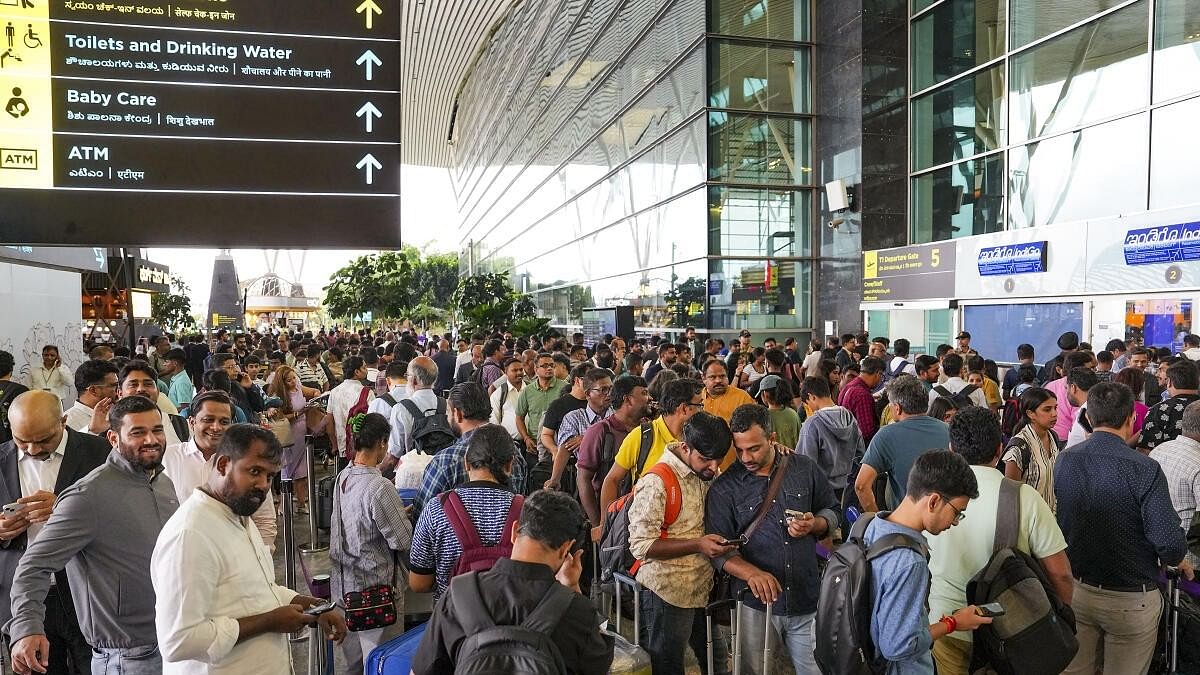
Stranded passengers at the Kempegowda International Airport Bengaluru amid Microsoft outage, in Bengaluru, Friday, July 19, 2024. Indigo, Air India Express, SpiceJet and Akasa at the Bengaluru airport began checking in passengers manually on Friday, issuing handwritten boarding passes, after a global Microsoft outage led to the Navitaire Departure Control System stalling.
Credit: PTI Photo
We have become accustomed to an uninterrupted, always-on always-powered digital world, where a simple click or tap provides instant access to our cricket scores, flight updates, videos or reels that prey on our voyeuristic instincts, video or text messaging, work and searching for a life partner. And profoundly more.
This seamless interconnectivity has become a fundamental human expectation. However, this digital utopia was shattered recently in what will be remembered as the most catastrophic IT failure in history. A flawed software update from cybersecurity firm CrowdStrike Holdings Inc. led to the crashing of countless Microsoft Windows systems worldwide, causing chaos across multiple sectors. Millions of Windows users experienced the dreaded Blue Screen of Death (BSOD), resulting in sudden system shutdowns or restarts. Microsoft quickly identified the issue as a result of the recent CrowdStrike update and initiated fixes to restore systems.
Despite these efforts, critical operations in various industries were severely disrupted. Be it airports globally, unable to board passengers as their IT systems were not accessible. Be it hospitals and emergency services teams in a few nations, whose systems and data could not be accessed. Be it corporates or the news and media sector. This cyber issue impacted or impaired many. Governments and national cybersecurity agencies, including CERT-In, issued advisories and maintained constant contact with Microsoft to mitigate the impact on corporates, banks, and airports. This incident should serve as a wake-up call about the vulnerabilities inherent in our digital dependency.
The alarming aspect of this global IT meltdown is the growing frequency of such disruptive events. Similar glitches from large consumer base platforms such as Amazon have previously caused temporary global system shutdowns. The latest Microsoft-CrowdStrike debacle just shows us the mirror on the precariousness of the world’s reliance on a few dominant cloud vendors.
The profundity of widespread catastrophic failure lies in the stark realisation that our modern digital infrastructure is precariously perched on a few dominant cloud vendors. These tech behemoths, while driving innovation and connectivity, have also created a bottleneck where a single point of failure can ripple across the globe. When critical sectors — ranging from finance to healthcare — are reliant on these few providers, a glitch or breach in one can lead to a domino effect, causing systemic disruptions. In short, the few global tech-influentials simply control our everyday lives.
The criticality of addressing this issue cannot be overstated. As our reliance on digital services grows, so does the potential for more severe and widespread disruptions. The concentration of cloud services in the hands of a few companies not only heightens the risk of catastrophic failures but also exposes global economies to cybersecurity threats and operational breakdowns. It is imperative for both policymakers and industry leaders to diversify their digital dependencies and invest in building more resilient infrastructures. This means encouraging competition, fostering innovation in smaller cloud providers, and ensuring robust backup systems are in place to safeguard against inevitable failures. But that’s a fallacy of an idea, ain’t it?
The Superb-Six — Microsoft, Apple, Google parent Alphabet, Amazon, Nvidia, and Meta Platforms — all products of the developed West, are deeply intertwined and control the narrative of the global digital ecosystem. Their growth is fuelled by the exponential rise of the Internet, computing power, and the widespread adoption of digital technologies.
These tech giants, with their vast influence over digital infrastructure, possess the capability to disrupt societal daily living with a mere click of a button. When their systems falter, the ripple effects can cripple essential services and erode public trust. This concentration of power raises profound concerns about the vulnerability and resilience of our digital dependencies, highlighting the urgent need for diversification and robust regulatory oversight to mitigate the risks posed by such monopolistic control.
The geopolitical race for AI supremacy and quantum computing further intensifies these worries, as nations vie for dominance in a technology that promises to redefine economic and military power, among all other powers. This competition accelerates the development and deployment of AI systems, often without sufficient consideration for the ethical, security, and societal implications. As countries and corporations alike push for breakthroughs, the potential for espionage, cyber-attacks, and digital warfare increases, exacerbating global tensions. The race to achieve AI supremacy could lead to hasty, unregulated advancements, amplifying the risks of widespread outages and security breaches. Moreover, the strategic importance of AI heightens the stakes, making the digital infrastructure not just a target for competitive sabotage but also a critical vulnerability in the broader landscape of international relations.
Expecting governments to collaborate and refrain from subversive attacks using non-State actors or any other leverage they possess is likely a meek human desire at best. In a world where geopolitical tensions and competition for dominance often overshadow co-operative efforts, the likelihood of unified global action to protect digital infrastructure remains slim. The intensifying AI supremacy wars further exacerbate these challenges, as nations prioritise strategic advantages over collective security. Consequently, we must brace ourselves for more frequent and severe outages, understanding that the pursuit of national interests and technological superiority often undermines the prospects for harmonious and coordinated responses to emerging threats.
(Srinath Sridharan is a policy researcher and corporate adviser. X: @ssmumbai.)
Disclaimer: The views expressed above are the author's own. They do not necessarily reflect the views of DH.